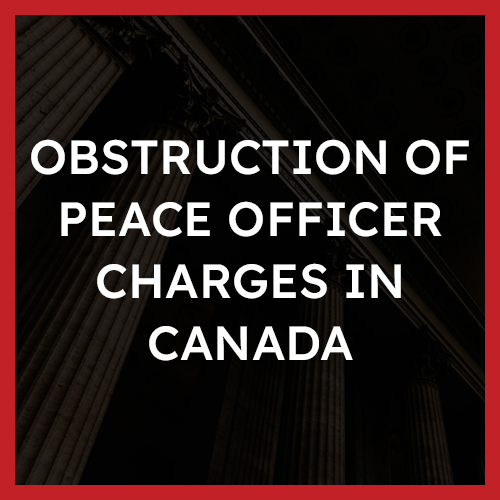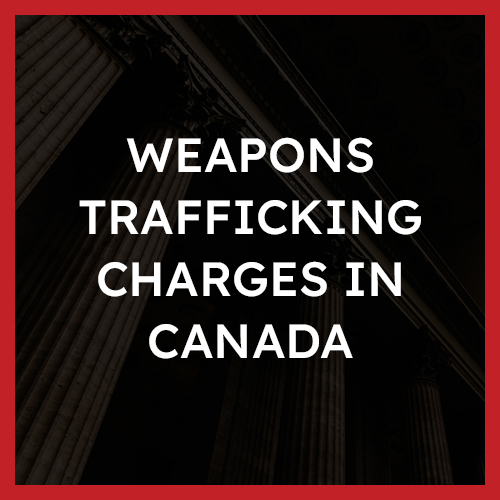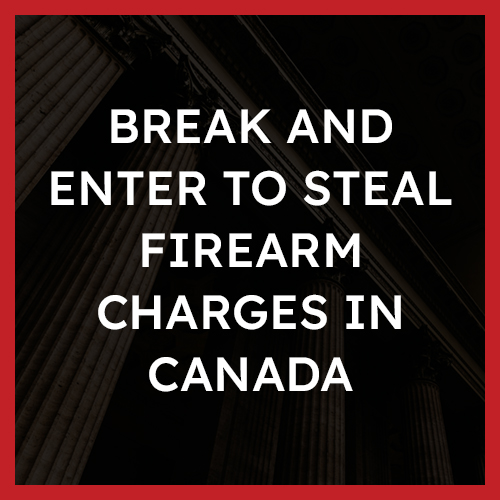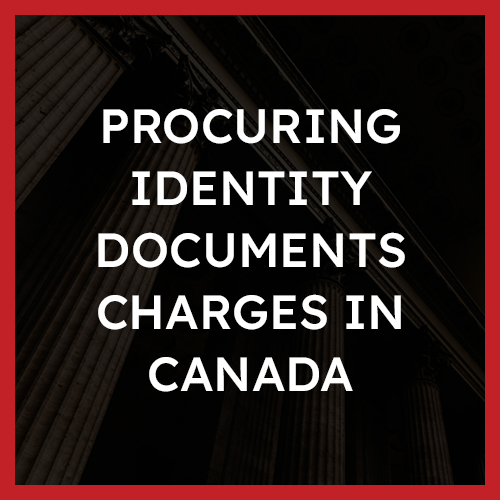Obstruction of Peace Officer (s.129) Charges in Canada: Offences, Defences, Punishments
What is obstructing a peace officer?
 Obstructing a peace officer is an offence under Section 129 of the Criminal Code of Canada. This section makes it a criminal offence to obstruct or resist a peace officer while they are performing the lawful execution of their duties.
Obstructing a peace officer is an offence under Section 129 of the Criminal Code of Canada. This section makes it a criminal offence to obstruct or resist a peace officer while they are performing the lawful execution of their duties.
Section 129 of the Criminal Code states that everyone who:
- (a) resists or wilfully obstructs a public officer or peace officer in the execution of his duty or any person lawfully acting in aid of such an officer,
- (b) omits, without reasonable excuse, to assist a public officer or peace officer in the execution of his duty in arresting a person or in preserving the peace, after having reasonable notice that he is required to do so, or
- (c) resists or wilfully obstructs any person in the lawful execution of a process against lands or goods or in making a lawful distress or seizure,
Section 129 is a dual/hybrid offence, which means the crown prosecutor can proceed by summary or by indictable offence.
Examples of Obstruction:
Some examples of the offence of obstructions may include both obstruction by impeding a peace officers investigation, as well as resisting arrest, by demonstrating physical non-compliance with an arrest:
- Refusing to comply with a lawful request from a peace officer
- Interfering with a peace officer’s investigation or arrest
- Resisting arrest
- Failing to assist a peace officer in the lawful execution of their duties may also result
Defences
A strong defence to a charge of obstructing a peace officer will vary depending on the circumstances of what occurred.
However, some defences may be:
- the accused was wrongly identified as the person who obstructed a peace officer.
- the peace officers were acting outside of the “lawful” execution of their duties when interacting with the accused
Punishment
The maximum penalty for a conviction under Section 129 is a fine of up to $5,000 or a term of imprisonment of up to two years, or both.
Whether you intend to plead guilty to a charge under section 129, it is important to consult a lawyer prior. There may be factors which apply to your punishment/sentencing which are relevant and important for consideration, which may result in a lesser punishment.
Overview of the Offence
This section is designed to protect peace officers from any form of obstruction or resistance that may impede the performance of their duties. Obstruction refers to any action or conduct that impedes, hinders, or interferes with the duties of a peace officer.
Section 129(a) states:
Offences relating to public or peace officer
129 Every one who
(a) resists or wilfully obstructs a public officer or peace officer in the execution of his duty or any person lawfully acting in aid of such an officer,
(b) omits, without reasonable excuse, to assist a public officer or peace officer in the execution of his duty in arresting a person or in preserving the peace, after having reasonable notice that he is required to do so, or
(c) resists or wilfully obstructs any person in the lawful execution of a process against lands or goods or in making a lawful distress or seizure,
is guilty of
(d) an indictable offence and is liable to imprisonment for a term not exceeding two years, or
(e) an offence punishable on summary conviction.
In order for a person to be convicted of obstructing a peace officer in criminal court, the crown is required to prove their case beyond a reasonable doubt. The crown must also prove several elements of the offence, such as that the person the accused obstructed was a peace officer, the peace officer was in the lawful execution of their duties, the actions of the accused impeded the peace officer’s ability to conduct their duties, the accused knew the peace officer was a peace officer and intended to impede their duties.
Lack of cooperation v. Obstruction
As established in the decision R v. Kennedy, 2016 ONCA 879 para. 36, resisting a peace officer requires more than simply being unco-operative during an arrest. It requires active physical resistance.
Obstructing a peace officer may be a charge that is seen more by the courts following the public health order and associated legislation if a person did not agree with the legislation (such as mask mandates) and felt they did not have to comply or legally identify themselves to a peace officer.
The Guilty Act (Actus Reus)
The actus reus for obstructing a peace officer is established by proof, beyond a reasonable doubt, of the following:
- The accused physically resisted arrest by twisting their body, tensing their arms, and refusing to place their hands behind their back when the police are trying to handcuff them when placing them under arrest.
Or
- The accused refused to provide their name to the police when being stopped for a traffic or other violation, when they were obligated by law to identify themselves to police, either by telling police their full name and date of birth or providing identification.
In establishing actus reus, the crown must prove that the peace officer was more than merely inconvenienced by the actions of the accused. As supported in the decision R v McGregor (2005) OJ No. 5836 para 13, a (peace) officer may be inconvenienced by an accused, but there must be more than momentary diversion or expenditure of effort.
The act of obstruction requires the crown to clearly prove that the actions of the accused support that the peace officer was obstructed
The Guilty Mind (Mens Rea)
The mens rea for obstructing a peace officer is established by proof, beyond a reasonable doubt, of the following:
- Intended to obstruct the peace officer by providing a false name
- Intended to resist lawful arrest by pulling away, tensing their arms and refusing to place their hands behind their back.
- Intended to obstruct police by interfering as peace officers were trying to lawfully arrest another person.
- It should be noted that by providing the name of another living person, in addition to a charge of section 129, may also constitute an offence of section 403(1)(d) of the Criminal Code of Canada by impersonating another person with the intent to avoid arrest.
Obstructing a Peace Officer Defences
How to beat an Obstructing a Peace Officer charge
Each circumstance is different, and the best defence available is contextual based on the details. However, the following are some common defences that may be used against a charge of obstructing a peace officer:
Self-Defence/Preservation
Self-defence may be raised as a defence to a charge of obstruction under Section 129 if the accused can prove that their actions were necessary to protect themselves from immediate harm or danger. This may apply to circumstances where a person feared harm to themselves if they were to provide assistance or aid to a peace officer, and therefore chose not to.
Lack of Knowledge/No Mens Rea or Mental Intent:
Lack of knowledge may also be raised as a defence if the accused can prove that they did not know that the person they were obstructing was a peace officer, such as if the police officer did not advise them that they were required to identify themselves, the reason for why the are required to identify themself, and caution them that failing to identify themself would result in a charge of obstruction. Unless there is a law to the contrary, as held in the courts in the matter R v Pauli 2014 SKQB 246 (Canlii) at para. 22, citizens are not obligated to provide information, even their name, to the police (who are peace officers). This emphasizes that the police are obligated to explain the context of why a person is required to identify themselves.
Lack of knowledge may often apply to section 129(b) in failing to assist a peace officer. If a peace officer directs a person to do something, for example, to close or lock a door, and the person does not, this is not assisting the peace officer.
Unlawful Arrest
If the charge of obstruction or resisting a peace officer is later determined to be the result of an unlawful arrest by the peace officer, or the person arrested charter rights were infringed by the peace officer’s actions, this may constitute a defence. If a person tries to interfere with the police who are placing another person under arrest, although this may also constitute obstructing a peace officer, as supported in R v Prince (1981), if the arrest was unlawful, then the police are no longer in the lawful execution of their duties.
Execution of the Peace Officers Duties
In order for guilt to be established, the peace officer must be in the lawful execution of their duties. When acting outside of their lawful authority or duties, a peace officer is not in the execution of their duties, as per R v Wilhem, 2014 ONSC 1637 (CanLii) at para. 104. Therefore, if a peace officer was off-duty, or did not properly identify themselves to a person, and thereby the accused did not know they were a person officer (see lack of knowledge) this may constitute a defence.
This may also apply when a peace officer is infringing on a person’s constitutionally protected charter rights, and therefore they are no longer in the lawful execution of their duties.
Identity
Depending on the circumstances of your case, a possible defence may be raised on the grounds of whether the peace officer properly established their identity.
Charter Defences
The Charter applies to circumstances where a peace officer may have infringed on a person’s rights. For example, if a person was unlawfully detained and was not lawfully required to provide the peace officer with their identification, but felt they had no choice but to comply, this may constitute psychological detention, which would result in a breach of charter rights.
Reasonable Justification
In the decision R v Greaves 2004 BCCA n484 (CanLii) at para. 49, the courts ruled that generally, a person cannot be convicted of obstructing a Police (peace) officer in the execution of their duties for simply refusing to say who they are when asked to do so. The courts distinguished in this matter that there is a difference between telling a false story, and preserving silence or refusing to answer.
Based on this, it demonstrates that it must be proven that the police are seemingly obliged to explain the reason a person must identify themselves to the police, as well as caution them that failure to do so would result in a criminal charge under section 129 of the criminal code.
Obstructing a Peace Officer Punishments
The maximum penalty for a conviction under Section 129 is a fine of up to $5,000 or a term of imprisonment of up to two years, or both.
If prosecuted by indictment, the maximum penalty is two years of incarceration.
If prosecuted by summary conviction, the maximum penalty is two years less a day, and/or a $5000 fine.
Whether you intend to plead guilty to a charge under section 129, it is important to consult a lawyer prior. There may be factors which apply to your punishment/sentencing which are relevant and important for consideration, which may result in a lesser punishment.
Frequently Asked Questions
Is obstructing a peace officer an indictable offence?
Obstructing a peace officer under section 129 is a hybrid offence. This means that the Crown prosecutor can choose to prosecute someone charged with escape from lawful custody either summarily or by indictment. If the Crown chooses to prosecute an accused by indictment, then the accused is found guilty, they will be charged with an indictable offence.
Published Decisions
R v Moore (1978)
The accused was a cyclist, and committed a traffic infraction, therefore providing a peace officer who observed the offence occur lawful reason to conduct a traffic stop, and identify the accused. This decision reinforces that there is no common law duty for citizens to identify themselves to the police, in the absence of an offence.
The peace officer chased the accused, who refused to identify himself. The courts held that due to the fact the accused was observed committing the traffic infraction of proceeding through a red light, albeit as a cyclist, he was obligated to stop and comply with the peace officer, which included identifying himself. As the peace officer was in the lawful execution of their duties in conducting this traffic enforcement, the accused’s actions constituted obstruction.
You can read the full decision here.
R v Johnson (1985)
The accused was the driver of a motor vehicle, stopped by a peace officer for speeding. The accused provided the peace officer a false name, therefore deliberately misleading the peace officer. The courts held that this constituted the offence of obstructing the peace officer, as the peace officer was engaged in the lawful execution of his duty by conducting traffic enforcement.
You can read the full decision here.
R v Quist (1981)
While a peace officer had the accused stopped for the purpose of an impaired driving investigation, the accused fled by running from the peace officer. The accused was found guilty of obstructing the peace officer, as although the accused was not yet placed under arrest, the accused was required to comply with the peace officer’s directions, as he was acting within the lawful execution of his duties. Police were operating a “marked” police van (with POLICE visible printed on it) and had activated the overhead emergency lights. By fleeing from a peace officer, the accused’s actions constituted obstruction.
You can read the full decision here.
About The Author
Ask A Question
We endeavor to respond to questions within 24 hours. If your matter is urgent, please call our office or submit a request for a free consultation.







